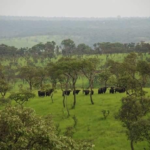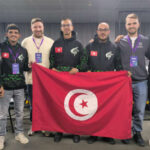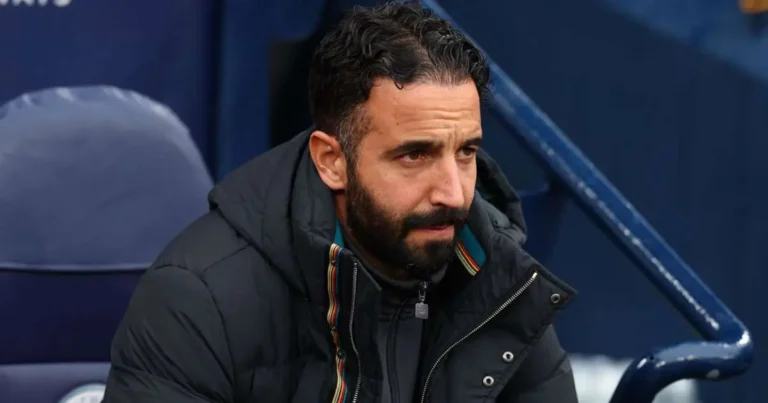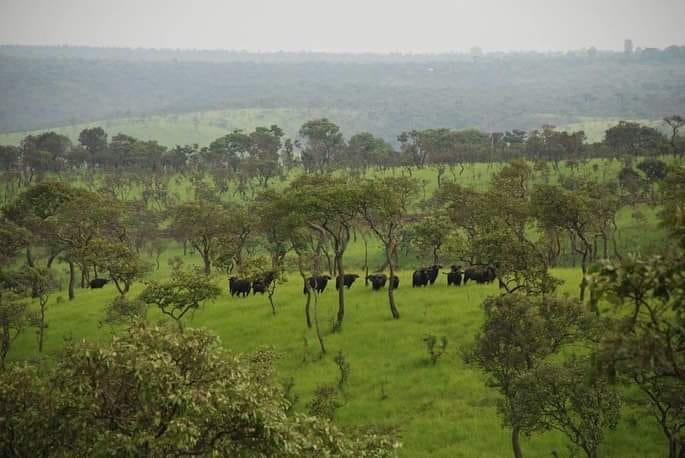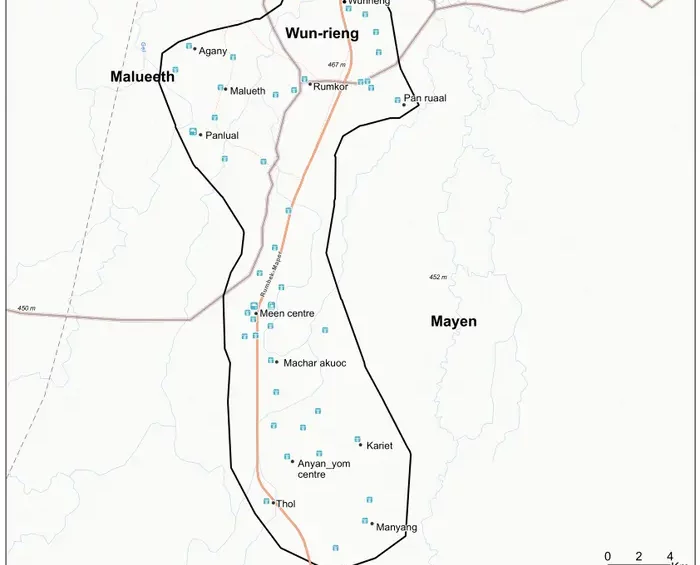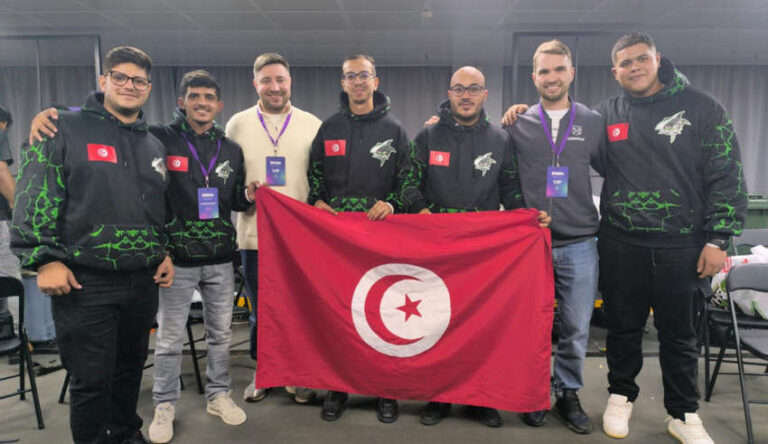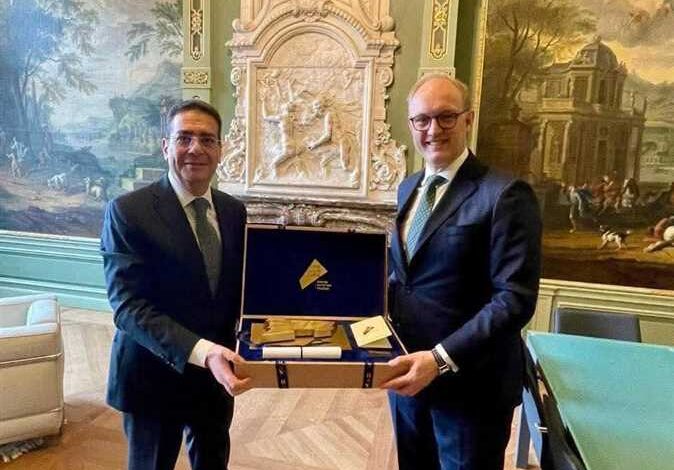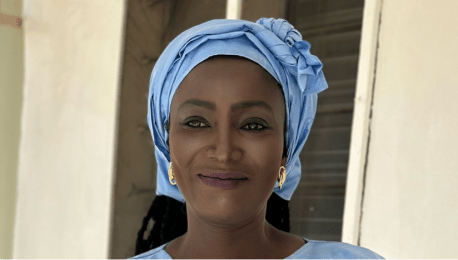
– Advertisement –
By dawn, the air was heavy with the sweet, damp scent of dew. The muezzin’s call still lingered faintly over the rooftops, blending with the rustle of early risers preparing for another day. Borogie balanced a small calabash of fresh milk in one hand and a bowl of garden vegetables in the other as she walked slowly toward Ousman Bah’s compound. Her steps were steady but her heart weighed with purpose.
She had not slept well. The sound of muffled weeping from Mbentoung’s house had reached her the night before — a sound that only mothers, sisters, and women who have known their own quiet grief could fully understand. It was the kind of weeping that carried exhaustion, not anger.
She found Ousman sitting where he always did in the mornings — on the long wooden bench under the neem tree, prayer beads rolling through his fingers. The sun had just begun to rise, casting soft orange light across his face. He looked older than she remembered, the lines around his mouth deeper, his eyes shadowed with sleeplessness.
– Advertisement –
“As-salamu alaykum, Caw,” Borogie greeted gently.
He looked up, his expression softening slightly. “Wa alaykum salam, Borogie. You are out early.”
“I came to check on the garden,” she said, setting down the calabash before him. “And to bring you some milk from our cow. It’s fresh from this morning.”
– Advertisement –
He nodded gratefully. “May Allah bless your hands.”
Borogie smiled faintly and lowered herself onto the opposite end of the bench. For a few moments, they sat in companionable silence, listening to the morning come alive — the distant crow of roosters, the soft laughter of children fetching water, the rhythmic sweep of brooms against sand.
Finally, she said quietly, “I passed by yesterday. You and Mbentoung… you both looked tired.”
He sighed heavily, the sound like air leaving a punctured gourd. “Tired, yes. Tired of words that lead nowhere.”
Borogie watched him carefully. “You still love her, though.”
He didn’t answer immediately. His fingers paused on the beads, then resumed their slow rhythm. “Love,” he said after a while, “is a tree that needs shade and water. Ours has had too much sun and not enough rain. I care for her, but caring feels like holding a flame in my hand. It burns.”
Borogie nodded slowly, her voice soft. “Sometimes, Ousman, women fight not because they wish to destroy peace, but because they fear being forgotten. Loneliness makes us restless. It makes our tongues sharp and our hearts defensive. Perhaps that is her way of asking to be seen.”
He looked at her, his gaze weary. “And must every plea come as a wound? I give her a home, security, my respect. But she turns those gifts into weapons. I did not marry her for war.”
Borogie smiled sadly. “And yet, even war ends when one side chooses silence. You, of all people, know peace cannot return if…” she hesitated, “Excuse my candor, pride guards the door.”
He was quiet. Then he murmured, “She has turned everyone against me, even you!.”
“No,” Borogie said gently. “She turned herself against herself. And in doing so, she lost her way. The rest of us only watched.”
Her tone was firm but tender, free of blame. “Ousman, you are a good man. You love your family, you honor your prayers. But you must remember — she is still a woman. Beneath her anger is a frightened heart. When the world praises one person in a marriage and forgets the other, the forgotten one begins to flail for air. Sometimes, that flailing hurts those closest to her.”
He lowered his eyes, saying nothing. The truth, spoken without accusation, settled between them like dust after a storm.
After a while, he asked quietly, “Do you think she still loves me?”
Borogie smiled, her eyes warm. “If she did not, her tears would not come so freely.”
He chuckled softly, almost ruefully. “Ah, Borogie… you speak like an old healer. You always find medicine in words.”
She laughed gently. “Maybe that is what suffering gives us — the patience to see beyond fault. Love is not what survives the good days, Caw Ousman. It is what endures the bad ones.”
She rose then, brushing the dust from her wrapper. “Go to her, if only to speak kindly. Not as a husband to a wife in battle, but as a man to a woman who has forgotten her worth.”
He nodded slowly. “I will try.”
Borogie smiled, placing a hand briefly on his shoulder. “Trying is where mercy begins.”
…
Later that morning, Borogie crossed into Mbentoung’s quarters. She found her sitting on the floor, her scarf untied, her eyes red from crying. A tray of untouched breakfast sat beside her.
“Ah, Mbentoung,” Borogie greeted softly, kneeling beside her. “You haven’t eaten.”
Mbentoung shook her head, wiping her face with the back of her hand. “My stomach rejects food,” she muttered bitterly. “Even the sound of his voice curdles my appetite.”
Borogie studied her silently for a long moment, then said, “You are angry, Mbentoung — but you are not alone. Every woman feels what you feel at some point. Marriage is not always a feast. Sometimes it is fasting.”
That drew a faint, shaky laugh from Mbentoung. “You speak in riddles, Borogie.”
“No,” Borogie replied softly, her gaze steady. “I speak in experience. You want him to see your pain, but you cannot show pain by wounding him. The more you strike, the more he shields himself from you. And the more you fight, the farther he drifts.”
Mbentoung lifted her chin slightly, her voice quieter but defiant. “I cannot be maltreated by a man and accept it the way you allow Yerro to do to you. I’ve watched him treat you like a log, while raising your co-wife like a queen. He never takes your side, nor even protects you from troublemakers like me. Yet you endure it. I cannot be that kind of woman. I will never accept a man’s cruelty or condone it. I was not cut out for that.”
Borogie took a deep breath, her expression calm but thoughtful. “And what if I tell you,” she said gently, “that what you call maltreatment is not always what it seems? I have my faults too, Mbentoung — many enough to keep me awake at night. A man’s temper or misgivings cannot shape my peace. Just because I am hurt does not mean I must return hurt for hurt.”
Her voice grew firmer, though still kind. “A man’s caprices should never dictate your behavior. If my husband, Yerro, chooses to favor another, I let him. Not because I am weak, but because my self-worth is not tied to his moods. I know who I am. His blindness does not make me less.”
She paused, her tone softening again. “You see, strength isn’t always in shouting, Mbentoung. Sometimes, it’s in knowing when silence protects your dignity better than words ever could.”
For a moment, neither woman spoke. The morning breeze stirred the edge of their wrappers, carrying with it the smell of cooking smoke from a nearby hearth. Mbentoung’s eyes glistened — not from surrender, but from the quiet realization that Borogie’s peace came not from submission, but from a deeper understanding of self.
Her lips quivered. “He no longer loves me.”
“Maybe,” Borogie said with gentleness, “he simply no longer recognizes the woman he loved.”
The words pierced softly, not cruelly. Mbentoung bowed her head and began to cry again, but this time her sobs were quieter — less angry, more sorrowful.
Borogie placed an arm around her shoulder, pulling her close. “Men are simpler than we think. They need peace more than perfection. You must decide what you want — to win, or to heal. Because both cannot live in the same house.”
Mbentoung wept into her lap, her pride crumbling. “I only wanted to be happy.”
“I know,” Borogie whispered. “And you can still be. But happiness begins where pride ends.”
They sat together for a long time, the air thick with the scent of milk and ashes, the sounds of life drifting from outside. And when Borogie finally rose to leave, she saw a faint light return to Mbentoung’s eyes—not yet peace, not yet reconciliation, but the fragile spark of hope.
…
That evening, as the sun set once more, Ousman Bah paused at the doorway of his wife’s room. The silence between them was heavy, but softer than before. She looked up at him, eyes swollen, hands still.
He hesitated, then said quietly, “You should eat. The food will grow cold.”
And though it was a small thing, almost nothing at all, it was the first thing he had said to her kindly in weeks.
Outside, somewhere in the distance, the faint cry of baby Muhammad rose and fell — a sound of new life threading through the tired sighs of the old.
And in that moment, the compound exhaled, just a little, as if mercy itself had stopped to rest there.
To be continued…


